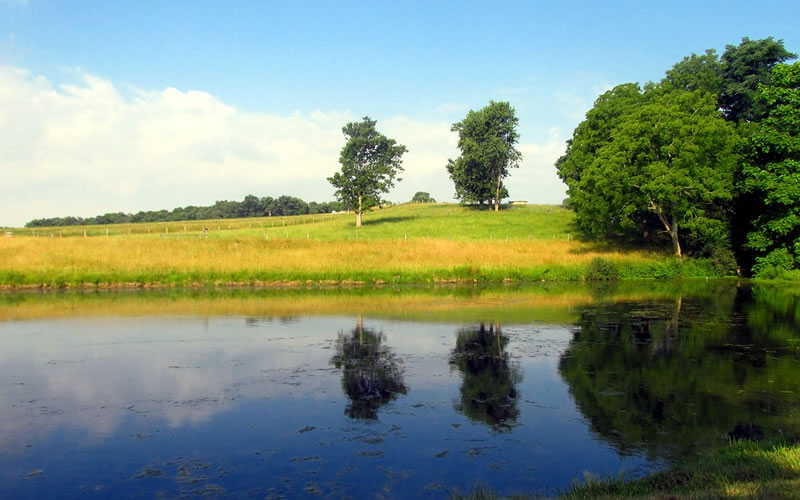
By Lindsay Street, Statehouse correspondent | A question over how water is used for crop irrigation in South Carolina is on hold — for now — but an agriculture advocate says family farmers are being inundated with misperceptions that they’re doing something wrong with a plentiful natural resource.
As S.C. conservation groups are preparing for another challenge to a state law that allows farms to withdraw massive amounts of water from rivers, farmers are ramping up a public relations battle to showcase their legacy as real conservation stewards.
“(The media have) created this nameless faceless entity and have lumped these family farms into this category of ‘mega-farms,’” said Stephanie Sox, director of promotion and education at the South Carolina Farm Bureau. “(Our farmers) are actual real people. It’s not robots; it’s not a factory.”
The farms have been called “mega-farms” in recent stories, but Sox says they are really family farms. Some families are small and some families are big, she says.
Background on the water issue
In 2010, the state enacted a surface water law that required any entity siphoning 3 million gallons per month from state rivers to obtain permits. Those permits required the entities such as farms to show that withdrawals were used wisely and would not impact neighbors. However, agriculture permit holders only need to report how much water they would need and how much they use.
Last year, the highest court in South Carolina said challengers to the law have not proven any environmental damages as a result of the law. Last month, the Supreme Court upheld its decision.
“It means that they [farmers] are still being recognized as an essential user of water and the Supreme Court realizes they are being judicious with their use of water,” Sox said.
Perspective on water volume
In 2016, the amount of surface water used for irrigation in South Carolina accounted for 1.6 billion gallons of water, according to state records. To get a perspective of how much water flows in South Carolina, the Broad River has a flow of more than 500,000 gallons per minute. Translated, that means that all of the surface water used in irrigation in 2016 flows in the Broad River in little more than three minutes.
 Sox said 3 million gallons of water is equivalent to a 5-acre strawberry field’s required water for one month. But that strawberry farmer may not need surface water at all. If the state is drought-free, the farmer may have enough water for his or her field. The farmer may also use groundwater. Irrigation with groundwater used about 37 billion gallons of water in 2016. However, in times of need — like a drought — farmers may need to turn to surface water, Sox said.
Sox said 3 million gallons of water is equivalent to a 5-acre strawberry field’s required water for one month. But that strawberry farmer may not need surface water at all. If the state is drought-free, the farmer may have enough water for his or her field. The farmer may also use groundwater. Irrigation with groundwater used about 37 billion gallons of water in 2016. However, in times of need — like a drought — farmers may need to turn to surface water, Sox said.
It’s times of drought that worry conservationists when it comes to surface water.
“When we are in a time of drought that’s when our surface waters are under the most strain and that’s when farmers need to water their crops the most,” said Amy Armstrong, executive director of South Carolina Environmental Law Project (SCELP).
To better understand how much surface water is being used in agriculture, Clemson University is conducting a survey this year.
Not about the farmers, attorney says
 SCELP represented plaintiffs in the water withdrawal lawsuit against state Department of Health and Environmental Control. The organization says it’s not about the farmers, but about applying the same permit requirements regardless of industry type.
SCELP represented plaintiffs in the water withdrawal lawsuit against state Department of Health and Environmental Control. The organization says it’s not about the farmers, but about applying the same permit requirements regardless of industry type.
“All we want is for farmers to have to go through the same permitting process that an industrial user has to go through, that a municipality has to go through,” Armstrong said.
She said the lawsuit isn’t a tool to blame farmers but a way to address changing state law and treating farmers like any other user.
Sox said it comes down to no evidence that the current permitting process is harmful.
“We have said from the very beginning that if the science shows agriculture is, in fact, draining ground and surface water than we obviously would support measures to prevent that from happening because we recognize water is an essential resource. But, right now, the science does not support that position,” Sox said.
Sox said South Carolina farmers have a vested interest in not over-using water.
“They are being very responsible of our natural resources,” she said. “Farmers don’t use water unless it’s absolutely necessary … The natural resources is a farm’s most valuable resources. It is essential for a farm’s sustainability to have those things. They have to take care of their most vital resource in order to preserve their farm and business.”
Armstrong countered that farm responsibility shouldn’t be on the honor system.
“Why are we treating farmers different?” she asked.
SCELP and its clients are regrouping for a new challenge in the meantime. But Armstrong did not say what that new challenge to the law would look like — only that decisions would be made soon.
“The question is not resolved,” Armstrong said. “(The court) certainly left the door open”
- Have a comment? Send to: feedback@statehousereport.com















 We Can Do Better, South Carolina!
We Can Do Better, South Carolina!